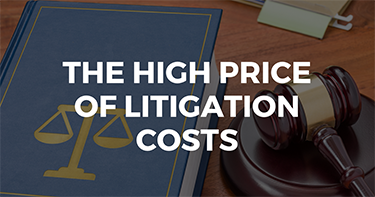 When people discuss the high cost of litigation, they often refer to the amount of attorney’s fees that are necessary in bringing or defending a lawsuit. Attorney’s fees are typically the largest burden in the expense of litigation, however, a civil suit in general can be very expensive. Did you know that in addition to attorney’s fees, there are filing fees, copying fees, court reporter fees, expert witness fees, process servers and other court and discovery related costs that could also saddle you with thousands of dollars in additional litigation expenses? Attorney’s fees are usually considered separate from the “cost” of trial. Many of these expenses are not recoverable from the other side. Before bringing a lawsuit, it is important to consider the costs related to litigation and the amount of money you will spend on the case.
When people discuss the high cost of litigation, they often refer to the amount of attorney’s fees that are necessary in bringing or defending a lawsuit. Attorney’s fees are typically the largest burden in the expense of litigation, however, a civil suit in general can be very expensive. Did you know that in addition to attorney’s fees, there are filing fees, copying fees, court reporter fees, expert witness fees, process servers and other court and discovery related costs that could also saddle you with thousands of dollars in additional litigation expenses? Attorney’s fees are usually considered separate from the “cost” of trial. Many of these expenses are not recoverable from the other side. Before bringing a lawsuit, it is important to consider the costs related to litigation and the amount of money you will spend on the case.
In California, the first fee is the initial cost of the lawsuit in filing the first papers from each side. Typically, the plaintiff files their complaint and the defendant responds with an answer or a demurrer. The first fee can range from $250 to $1000 depending on the type of civil case that is filed. The filing of a cross complaint will incur similar costs to filing a first paper. In addition, the courts will charge a court reporter’s fee, and in a demand for jury trial there will also fees related to obtaining a jury. Throughout the litigation process there are often motions filed with the court, asking to strike the complaint or cross complaint, exclude certain witnesses or evidence, or having the court make a ruling of a matter of law. Here in California, motion fees are $60 per motion filed. A party to a lawsuit can also find themselves hit with miscellaneous filing fees for other documents filed on the way to trial.
The way documents are filed can also be of cost to a party. Court documents are usually filed in person, via facsimile or electronically if the court is set up with E-filing. Unless the documents filed in person are done by the attorney or a member of their staff, a court agency is often used and a “runner” would be filing the documents on behalf of the law firm. With this, comes the cost of hiring the runner, the cost is often dependent on the agency used, where the filing takes place and the number of pages of the document. It could also be determined based on whether or not the documents were scanned or faxed to the agency or if the runner needs to pick up the original from the law office prior to filing with the court. When filing via facsimile, there is usually a cost per page in addition to the filing fee of the document itself. E-filing also has a fee charged for each document filed with the court, ranging from $5-$10 per transaction.
Moreover, certain documents require that a party to a lawsuit be personally served. A court agency will also be used in personal service of such documents, and there will again be fees associated with the service of process dependent on certain factors such as the agency used, where the service takes place and the number of pages of the document. A party to a lawsuit may also incur costs for copying, obtaining records from the court, recording documents with the county recorder’s office, the cost to pay witnesses or expert witnesses to testify at trial, costs related to the production of documents in discovery or the cost of conducting a deposition and other miscellaneous fees. As good practice, an attorney will usually discuss with a client the different steps to the litigation process, as well as the anticipated costs, and itemize such costs for the client in their monthly billing.
As a civil defense attorney in Fullerton, I can tell you that there is certainly a high price to pay for the cost of litigation. This information is not to dissuade a plaintiff from bringing a lawsuit, but rather educate one on the intricacies of the legal system and the expectation of costs. When opting to bring a lawsuit or hire a civil litigation attorney to defend one, best practice is to have the attorney take a specified amount of money from the client and place it aside for the initial costs of litigation.
However, a good civil defense attorney must keep litigation costs to a minimum and must also consider the client’s ability to pay those costs. Learning to get the most bang out of your buck (especially in a civil lawsuit arena) is an art that not all practitioners know.